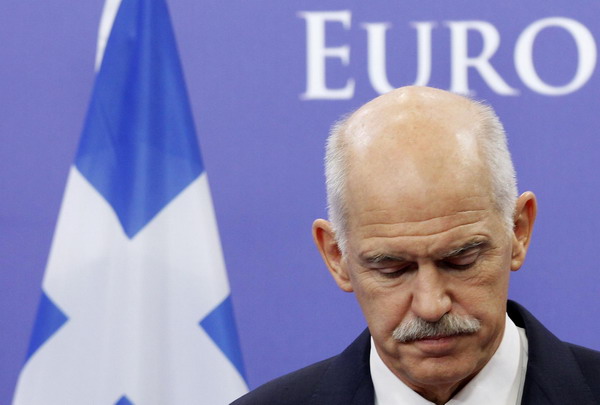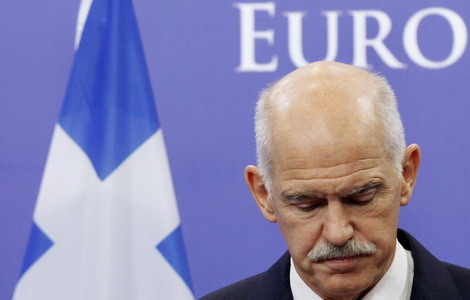Greek referendum deepens euro zone crisis
Updated: 2011-11-01 22:07
(Agencies)
|
|||||||||||
ATHENS - The leaders of France and Germany scrambled on Tuesday to limit damage after Prime Minister George Papandreou decided to let Greeks vote on a bailout package - a move that stunned markets and threw Greece's euro zone membership into question.
 |
|
Greece's Prime Minister George Papandreou briefs the media after a meeting with European Council President Herman Van Rompuy in Brussels in this October 13, 2011 file photo. [Photo/Agencies] |
European politicians complained Athens was trying to wriggle out of the 130 billion-euro rescue deal agreed at a summit only last week, concerned not so much about the fate of Greece as the possibly dire consequences for the entire currency union of the referendum.
Ireland, which itself took a bailout, attacked Papandreou's idea.
"The summit last week was to deal with the uncertainty in the euro zone...and this grenade is thrown in just a few short days later," European affairs minister Lucinda Creighton said.
"Legitimately there is going to be a lot of annoyance about it," she told Reuters.
The Greek opposition demanded a snap election and financial markets, which had calmed down after euro zone leaders agreed the second Greek bailout, took Papandreou's bombshell badly.
Shares in banks dived, investors fled to the safety of German bonds and Italian borrowing costs climbed despite European Central Bank action. Investors speculated that Italy might follow a similar path.
French President Nicolas Sarkozy will call German Chancellor Angela Merkel on Tuesday, his office said, while emotions ran high in Greece itself about the referendum idea.
"They must be crazy... this is no way to run a country," said the senior executive of one of Greece's biggest firms, speaking on condition of anonymity.
One senior German parliamentarian suggested the euro zone might cast Athens adrift, cutting off its aid lifeline and allowing the nation to default on its huge debts.
"This sounds to me like someone is trying to wriggle out of what was agreed - a strange thing to do," said Rainer Bruederle, a leader in Merkel's coalition.
Bruederle, parliamentary floor leader for the Free Democrats and a former German economy minister, said he was irritated by Papandreou's announcement.
Europe would have to consider turning off the flow of money which is keeping Greece afloat, he told Deutschlandfunk radio.
"One can only do one thing: make the preparations for the eventuality that there is a state insolvency in Greece and if it doesn't fulfil the agreements, then the point will have been reached where the money is turned off," he said.
Others were stunned by Papandreou's apparent bolt from the blue on Monday on the plan, which includes a 50-percent write-down on Greece's debts but has unleashed fury among Greeks due to its price - yet more austerity.
But they also urged caution as the exact question to be put to the Greek people and the date for the vote remains unknown. EU officials had yet to be officially notified of the poll.
Hot Topics
Libya conflict, Gaddafi, Oil spill, Palace Museum scandal, Inflation, Japan's new PM, Trapped miners, Mooncake tax, Weekly photos, Hurricane Irene
Editor's Picks

|

|

|

|

|

|







